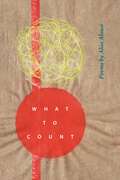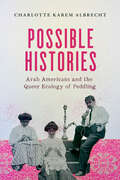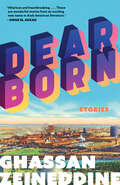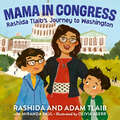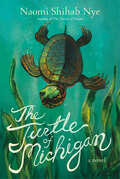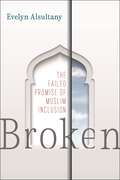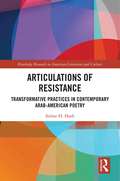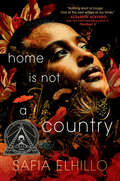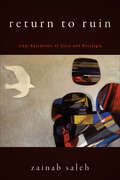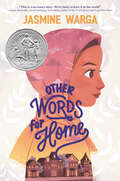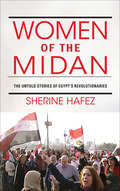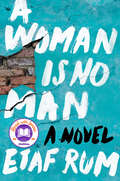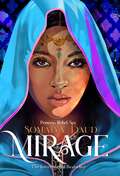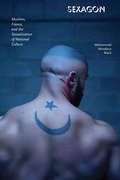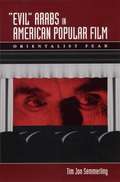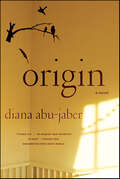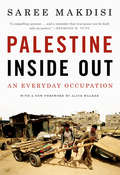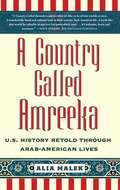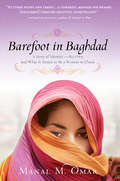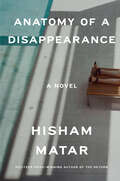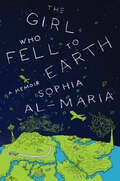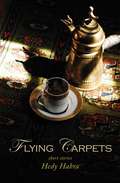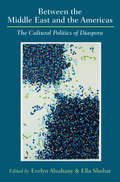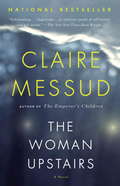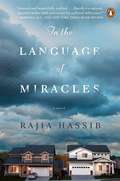Special Collections
Arab American Book Award
- Table View
- List View
What to Count
by Alise AlousiWith heart and insight, the poems in Alise Alousi’s What to Count speak to what it means to come of age as an Iraqi American during the first Gulf War and its continuing aftermath, but also to the joy and complexity of motherhood, daughterhood, and what it means to live a creative life. More than a description of the world, Alousi’s poetry actively lives in and of the world. These poems explore the nuances of memory through the changes wrought by time, conflict, and distance. In "The Ocularist" and "Art," and others, Alousi’s extraordinary verbal deftness precisely locates the still-tender pains and triumphs of collective being while trying to be an individual in the world. What to Count is a remarkable collection of contemporary poetry—both a lyrical splendor and a contemplative account of lineage, silenced history, and identity.
Possible Histories
by Charlotte Karem AlbrechtA free ebook version of this title is available through Luminos, University of California Press’s Open Access publishing program. Visit www.luminosoa.org to learn more. Many of the hundreds of thousands of Syrians who immigrated to the US beginning in the 1870s worked as peddlers. Men were able to transgress Syrian norms related to marriage practices while they were traveling, while Syrian women accessed more economic autonomy though their participation in peddling networks. In Possible Histories, Charlotte Karem Albrecht explores this peddling economy of the late nineteenth and early twentieth centuries as a site for revealing how dominant ideas about sexuality are imbricated in Arab American racial histories. Karem Albrecht marshals a queer affective approach to community and family history to show how Syrian immigrant peddlers and their interdependent networks of labor and care appeared in interconnected discourses of modernity, sexuality, gender, class, and race. Possible Histories conceptualizes this profession, and its place in narratives of Arab American history, as a "queer ecology" of laboring practices, intimacies, and knowledge production. This book ultimately proposes a new understanding of the long arm of Arab American history that puts sexuality and gender at the heart of ways of navigating US racial systems.
Dearborn
by Ghassan ZeineddineWinner of the 2023 Khayrallah Book Prize Finalist for the 2024 CLMP Firecracker Award for Debut Fiction Shortlisted for the 2024 William Saroyan International Prize for Writing A Washington Post Best Book of September • Named a Best Book of the Year at Electric Lit, Chicago Public Library, Powell’s, and Kirkus Reviews “Sly, straight-faced, tenderly wicked. . . . A classic American short story collection.”—Michael Chabon A sharp, tender, and uproariously funny portrait of the lives of Arab American community members in Dearborn, Michigan. Spanning several decades, Ghassan Zeineddine’s debut collection examines the diverse range and complexities of the Arab American community in Dearborn, Michigan. In ten tragicomic stories, Zeineddine explores themes of identity, generational conflicts, war trauma, migration, sexuality, queerness, home and belonging, and more. In Dearborn, a father teaches his son how to cheat the IRS and hide their cash earnings inside of frozen chickens. Tensions heighten within a close-knit group of couples when a mysterious man begins to frequent the local gym pool, dressed in Speedos printed with nostalgic images of Lebanon. And a failed stage actor attempts to drive a young Lebanese man with ambitions of becoming a Hollywood action hero to LA, but Immigration and Customs Enforcement agents have other plans. By turns wildly funny, incisive, and deeply moving, Dearborn introduces readers to an arresting new voice in contemporary fiction and invites us all to consider what it means to be part of a place and community, and how it is that we help one another survive.
Mama in Congress
by Miranda Paul and Rashida Tlaib and Adam TlaibAn inspiring picture book that tells the story of Rashida Tlaib, one of the first Muslim women elected to Congress, and her family. Perfect for readers of books that celebrate trailblazing women and social activists as well as those looking for an introduction to civic engagement and how government works."Hey Adam, is the president Mom's boss now?"When Yousif Tlaib asks about his mom's new job in Congress, his older brother, Adam, fills him in—with some help from Rashida Tlaib herself. As he tells his mom’s story, Adam reveals information about how elections and our government work, what it means to break barriers, what motivates their mama to work for justice for all, and how love and family have guided them through this historic time in our country.From growing up in Detroit—the eldest of fourteen siblings and the first in her immigrant family to graduate from high school—through her journey into community activism and then local politics, to eventually becoming one of the first Muslim Congresswomen and an influential national figure, Rashida Tlaib's inspiring story shows kids that they, too, can do great things and make a difference.
The Turtle of Michigan
by Naomi Shihab NyeThe stand-alone companion to National Book Award Finalist and beloved poet Naomi Shihab Nye’s The Turtle of Oman. The Turtle of Michigan is a deft and accessible novel that follows a young boy named Aref as he travels from Muscat, Oman, to Ann Arbor, Michigan, and adjusts to a new life and a new school in the United States. A wonderful pick for young middle grade readers and fans of Other Words for Home and Billy Miller Makes a Wish. Aref is excited for his journey to reunite with his father in Ann Arbor, Michigan. Aref makes a friend on an airplane, wonders what Michigan will be like, and starts school in the United States. While he does miss his grandfather, his Sidi, Aref knows that his home in Oman will always be waiting for him.Award-winning author Naomi Shihab Nye’s highly anticipated sequel to The Turtle of Oman explores immigration, family, and what it means to feel at home. Carrying a suitcase and memories of Oman, Aref experiences the excitement and nervousness that accompanies moving to a new home. The Turtle of Michigan is a great choice for reading aloud and a must-have for younger middle grade readers. Illustrated in black-and-white throughout.
Broken
by Evelyn AlsultanyPROSE Award- Media and Cultural Studies FinalistHow diversity initiatives end up marginalizing Arab Americans and US Muslims One of Donald Trump’s first actions as President was to sign an executive order to limit Muslim immigration to the United States, a step toward the “complete shutdown of Muslims entering the United States” he had campaigned on. This extraordinary act of Islamophobia provoked unprecedented opposition: Hollywood movies and mainstream television shows began to feature more Muslim characters in contexts other than terrorism; universities and private businesses included Muslims in their diversity initiatives; and the criminal justice system took hate crimes against Muslims more seriously. Yet Broken argues that, even amid this challenge to institutionalized Islamophobia, diversity initiatives fail on their promise by only focusing on crisis moments.Evelyn Alsultany argues that Muslims get included through “crisis diversity,” where high-profile Islamophobic incidents are urgently responded to and then ignored until the next crisis. In the popular cultural arena of television, this means interrogating even those representations of Muslims that others have celebrated as refreshingly positive. What kind of message does it send, for example, when a growing number of “good Muslims” on TV seem to have arrived there, ironically, only after leaving the faith? In the realm of corporations, she critically examines the firing of high-profile individuals for anti-Muslim speech—a remedy that rebrands corporations as anti-racist while institutional racism remains intact. At universities, Muslim students get included in diversity, equity, and inclusion plans but that gets disrupted if they are involved in Palestinian rights activism. Finally, she turns to hate crime laws revealing how they fail to address root causes. In each of these arenas, Alsultany finds an institutional pattern that defangs the promise of Muslim inclusion, deferring systemic change until and through the next “crisis.”
Articulations of Resistance
by Sirene HarbUsing a theoretical framework located at the intersection of US ethnic studies, transnational studies, and postcolonial studies, Articulations of Resistance: Transformative Practices in Arab-American Poetry maps an interdisciplinary model of critical inquiry to demonstrate the intimate link and multilayered connections between poetry and resistance. In this study of contemporary Arab-American poetry, Sirène Harb analyzes how resistance, defined as the force challenging the dominant, intervenes in ways of rethinking the local and the global vis-à-vis traditional paradigms of time, space, language and value.
Home Is Not a Country
by Safia ElhilloA mesmerizing novel in verse about family, identity, and finding yourself in the most unexpected places--for fans of The Poet X, I Am Not Your Perfect Mexican Daughter, and Jason Reynolds.
Nima doesn't feel understood. By her mother, who grew up far away in a different land. By her suburban town, which makes her feel too much like an outsider to fit in and not enough like an outsider to feel like that she belongs somewhere else. At least she has her childhood friend Haitham, with whom she can let her guard down and be herself. Until she doesn't.
As the ground is pulled out from under her, Nima must grapple with the phantom of a life not chosen, the name her parents didn't give her at birth: Yasmeen. But that other name, that other girl, might just be more real than Nima knows. And more hungry. And the life Nima has, the one she keeps wishing were someone else's. . .she might have to fight for it with a fierceness she never knew she had."
Nothing short of magic...One of the best writers of our times."-- Elizabeth Acevedo, New York Times Bestselling author of The Poet X
Return to Ruin
by Zainab SalehWith the U.S. invasion of Iraq, Iraqis abroad, hoping to return one day to a better Iraq, became uncertain exiles. Return to Ruin tells the human story of this exile in the context of decades of U.S. imperial interests in Iraq—from the U.S. backing of the 1963 Ba'th coup and support of Saddam Hussein's regime in the 1980s, to the 1991 Gulf War and 2003 invasion and occupation. Zainab Saleh shares the experiences of Iraqis she met over fourteen years of fieldwork in Iraqi London—offering stories from an aging communist nostalgic for the streets she marched since childhood, a devout Shi'i dreaming of holy cities and family graves, and newly uprooted immigrants with fresh memories of loss, as well as her own. Focusing on debates among Iraqi exiles about what it means to be an Iraqi after years of displacement, Saleh weaves a narrative that draws attention to a once-dominant, vibrant Iraqi cultural landscape and social and political shifts among the diaspora after decades of authoritarianism, war, and occupation in Iraq. Through it all, this book illuminates how Iraqis continue to fashion a sense of belonging and imagine a future, built on the shards of these shattered memories.
Other Words for Home
by Jasmine WargaA gorgeously written, hopeful middle grade novel in verse about a young girl who must leave Syria to move to the United States, perfect for fans of Jason Reynolds and Aisha Saeed.
Jude never thought she’d be leaving her beloved older brother and father behind, all the way across the ocean in Syria.
But when things in her hometown start becoming volatile, Jude and her mother are sent to live in Cincinnati with relatives.
At first, everything in America seems too fast and too loud. The American movies that Jude has always loved haven’t quite prepared her for starting school in the US—and her new label of “Middle Eastern,” an identity she’s never known before.
But this life also brings unexpected surprises—there are new friends, a whole new family, and a school musical that Jude might just try out for. Maybe America, too, is a place where Jude can be seen as she really is.
This lyrical, life-affirming story is about losing and finding home and, most importantly, finding yourself.
A New York Times Bestseller
Women of the Midan
by Sherine HafezAn exploration of gender, the Arab Spring, and women&’s experiences of revolution, including firsthand accounts. In Women of the Midan, Sherine Hafez demonstrates how women were a central part of revolutionary process of the Arab Spring. Women not only protested in the streets of Cairo, they demanded democracy, social justice, and renegotiation of a variety of sociocultural structures. Women&’s resistance to state control, Islamism, neoliberal market changes, the military establishment, and patriarchal systems forged new paths of dissent and transformation. Through firsthand accounts of women who participated in the revolution, Hafez illustrates how the gendered body signifies collective action and the revolutionary narrative. Using the concept of rememory, Hafez shows how the body is inseparably linked to the trauma of the revolutionary struggle. While delving into the complex weave of public space, government control, masculinity, and religious and cultural norms, Hafez sheds light on women&’s relationship to the state in the Arab world today and how the state, in turn, shapes individuals and marks gendered bodies.
A Woman Is No Man
by Etaf RumA Goodreads Choice Awards Finalist for Best Fiction and Best Debut • BookBrowse's Best Book of the Year • A Marie Claire Best Women's Fiction of the Year • A Real Simple Best Book of the Year • A PopSugar Best Book of the Year • A New York Times Book Review Editors’ Choice • A Washington Post 10 Books to Read in March • A Newsweek Best Book of the Summer • A USA Today Best Book of the Week • A Washington Book Review Difficult-To-Put-Down Novel • A Refinery 29 Best Books of the Month • A Buzzfeed News 4 Books We Couldn't Put Down Last Month • A New Arab Best Books by Arab Authors • An Electric Lit 20 Best Debuts of the First Half of 2019 • A The Millions Most Anticipated Books of the Year“Garnering justified comparisons to Khaled Hosseini’s A Thousand Splendid Suns... Etaf Rum’s debut novel is a must-read about women mustering up the bravery to follow their inner voice.” —Refinery 29The New York Times bestseller and Read with Jenna TODAY SHOW Book Club pick telling the story of three generations of Palestinian-American women struggling to express their individual desires within the confines of their Arab culture in the wake of shocking intimate violence in their community."Where I come from, we’ve learned to silence ourselves. We’ve been taught that silence will save us. Where I come from, we keep these stories to ourselves. To tell them to the outside world is unheard of—dangerous, the ultimate shame.”Palestine, 1990. Seventeen-year-old Isra prefers reading books to entertaining the suitors her father has chosen for her. Over the course of a week, the naïve and dreamy girl finds herself quickly betrothed and married, and is soon living in Brooklyn. There Isra struggles to adapt to the expectations of her oppressive mother-in-law Fareeda and strange new husband Adam, a pressure that intensifies as she begins to have children—four daughters instead of the sons Fareeda tells Isra she must bear.Brooklyn, 2008. Eighteen-year-old Deya, Isra’s oldest daughter, must meet with potential husbands at her grandmother Fareeda’s insistence, though her only desire is to go to college. Deya can’t help but wonder if her options would have been different had her parents survived the car crash that killed them when Deya was only eight. But her grandmother is firm on the matter: the only way to secure a worthy future for Deya is through marriage to the right man.But fate has a will of its own, and soon Deya will find herself on an unexpected path that leads her to shocking truths about her family—knowledge that will force her to question everything she thought she knew about her parents, the past, and her own future.
Mirage
by Somaiya DaudThis “enriching, thrilling, and captivating” (BuzzFeed) Moroccan-inspired debut “has what it takes to be the next big thing in sci-fi/fantasy” (SLJ, starred review)!In a world dominated by the brutal Vathek empire, eighteen-year-old Amani is a dreamer. She dreams of what life was like before the occupation; she dreams of writing poetry like the old-world poems she adores; she dreams of receiving a sign from Dihya that one day, she, too, will have adventure, and travel beyond her isolated home.But when adventure comes for Amani, it is not what she expects: she is kidnapped by the regime and taken in secret to the royal palace, where she discovers that she is nearly identical to the cruel half-Vathek Princess Maram. The princess is so hated by her conquered people that she requires a body double, someone to appear in public as Maram, ready to die in her place.As Amani is forced into her new role, she can’t help but enjoy the palace’s beauty—and her time with the princess’ fiancé, Idris. But the glitter of the royal court belies a world of violence and fear. If Amani ever wishes to see her family again, she must play the princess to perfection...because one wrong move could lead to her death.
Sexagon
by Mehammed Amadeus MackHonorable Mention, Association for Middle East Women’s StudiesHonorable Mention, 2018 Arab American Book Awards (Non-Fiction)In contemporary France, particularly in the banlieues of Paris, the figure of the young, virile, hypermasculine Muslim looms large. So large, in fact, it often supersedes liberal secular society’s understanding of gender and sexuality altogether. Engaging the nexus of race, gender, nation, and sexuality, Sexagon studies the broad politicization of Franco-Arab identity in the context of French culture and its assumptions about appropriate modes of sexual and gender expression, both gay and straight.Surveying representations of young Muslim men and women in literature, film, popular journalism, television, and erotica as well as in psychoanalysis, ethnography, and gay and lesbian activist rhetoric, Mehammed Amadeus Mack reveals the myriad ways in which communities of immigrant origin are continually and consistently scapegoated as already and always outside the boundary of French citizenship regardless of where the individuals within these communities were born. At the same time, through deft readings of—among other things—fashion photography and online hook-up sites, Mack shows how Franco-Arab youth culture is commodified and fetishized to the point of sexual fantasy.Official French culture, as Mack suggests, has judged the integration of Muslim immigrants from North and West Africa—as well as their French descendants—according to their presumed attitudes about gender and sexuality. More precisely, Mack argues, the frustrations consistently expressed by the French establishment in the face of the alleged Muslim refusal to assimilate is not only symptomatic of anxieties regarding changes to a “familiar” France but also indicative of an unacknowledged preoccupation with what Mack identifies as the “virility cultures” of Franco-Arabs, rendering Muslim youth as both sexualized objects and unruly subjects.The perceived volatility of this banlieue virility serves to animate French characterizations of the “difficult” black, Arab, and Muslim boy—and girl—across a variety of sensational newscasts and entertainment media, which are crucially inflamed by the clandestine nature of the banlieues themselves and non-European expressions of virility. Mirroring the secret and underground qualities of “illegal” immigration, Mack shows, Franco-Arab youth increasingly choose to withdraw from official scrutiny of the French Republic and to thwart its desires for universalism and transparency. For their impenetrability, these sealed-off domains of banlieue virility are deemed all the more threatening to the surveillance of mainstream French society and the state apparatus.
"Evil" Arabs in American Popular Film
by Tim Jon SemmerlingLooking at their narrative structures and visual tropes, he analyzes how the films portray Arabs as threatening to subvert American "truths" and mythic tales—and how the insecurity this engenders causes Americans to project evil character and intentions on Arab peoples, landscapes, and cultures. Semmerling also demonstrates how the "evil" Arab narrative has even crept into the documentary coverage of 9/11. Overall, Semmerling's probing analysis of America's Orientalist fears exposes how the "evil" Arab of American popular film is actually an illusion that reveals more about Americans than Arabs.
Origin
by Diana Abu-Jaber"Finally, a novel of literary suspense that gets almost everything right—forensically and psychologically." —Sarah Weinman, Baltimore SunSecretly, in her heart of hearts, Lena Dawson hides the strangest of beliefs about her childhood. Hiding behind a cool competence as a superb fingerprint analyst in a crime lab in snowy Syracuse, New York, she feels totally out of place in the ordinary world of human interaction. Especially since the controlling husband who guided and protected her, then cheated and left her (though now he wants her back). Her uncanny ability to read a crime scene draws her into investigating a mysterious series of crib deaths—but ultimately the most difficult puzzle she must solve is the one of her own origins.Diana Abu-Jaber, a “gifted and graceful writer” (Chicago Tribune), masterfully “transcends formula” (Kirkus Reviews) as “the tension of Origin escalates, shaped as much by beautifully nuanced prose as menacing events” (New York Daily News).
Palestine Inside Out
by Alice Walker and Saree MakdisiTending one's fields, visiting a relative, going to the hospital: for ordinary Palestinians, such activities require negotiating permits and passes, curfews and closures, "sterile roads" and "seam zones"--bureaucratic hurdles ultimately as deadly as outright military incursion.
In Palestine Inside Out, Saree Makdisi draws on eye-opening statistics, academic histories, UN reports, and contemporary journalism to reveal how the "peace process" institutionalized Palestinians' loss of control over their inner and outer lives--and argues powerfully and convincingly for a one-state solution.
A Country Called Amreeka
by Alia MalekAmong the surfeit of narratives about Arabs that have been published in recent years, surprisingly little has been reported on Arabs in America -- an increasingly relevant issue.
This book is the most powerful approach imaginable: it is the story of the last forty-plus years of American history, told through the eyes of Arab Americans. It begins in 1963, before major federal legislative changes seismically transformed the course of American immigration forever. Each chapter describes an event in U. S. history -- which may already be familiar to us -- and invites us to live that moment in time in the skin of one Arab American.
The chapters follow a timeline from 1963 to the present, and the characters live in every corner of this country. These are dramatic narratives, describing the very human experiences of love, friendship, family, courage, hate, and success. There are the timeless tales of an immigrant community becoming American, the nostalgia for home, the alienation from a society sometimes as intolerant as its laws are generous. A Country Called Amreeka's snapshots allow us the complexity of its characters' lives with an impassioned narrative normally found in fiction. Read separately, the chapters are entertaining and harrowing vignettes; read together, they add a new tile to the mosaic of our history.
We meet fellow Americans of all creeds and colors, among them the Alabama football player who navigates the stringent racial mores of segregated Birmingham, where a church bombing wakes a nation to the need to make America a truly more equal place; the young wife from Ramallah -- now living in Baltimore -- who had to abandon her beautiful home and is now asked by a well-meaning American, "How do you like living in an apartment after living in a tent?"; the Detroit toughs and the potsmoking suburban teenagers, who in different decades become politicized and serious about their heritage despite their own wills; the homosexual man afraid to be gay in the Arab world and afraid to be Arab in America; the two formidable women who wind up working for opposing campaigns in the 2000 presidential election; the Marine fighting in Iraq who meets villagers who ask him, "What are you, an Arab, doing here?"
We glimpse how America sees Arabs as much as how Arabs see America. We revisit the 1973 oil embargo that initiated the American perception of all Arabs as oil-rich sheikhs; the 1979 Iranian hostage crisis that heralded the arrival of Middle Eastern Islam in the American consciousness; bombings across three decades in Los Angeles, Oklahoma City, and New York City that bring terrorism to American soil; and both wars in Iraq that have posed Arabs as the enemies of America. In a post-9/11 world, Arabic names are everywhere in America, but our eyes glaze over them; we sometimes don't know how to pronounce them or understand whence they come.
A Country Called Amreeka gives us the faces behind those names and tells the story of a community it has become essential for us to understand. We can't afford to be oblivious.
Barefoot in Baghdad
by Manal Omar"Walk barefoot and the thorns will hurt you..." --Iraqi-Turkmen proverb
A riveting story of hope and despair, of elation and longing, Barefoot in Baghdad takes you to the front lines of a different kind of battle, where the unsung freedom fighters are strong, vibrant--and female.
An American aid worker of Arab descent, Manal Omar moves to Iraq to help as many women as she can rebuild their lives. She quickly finds herself drawn into the saga of a people determined to rise from the ashes of war and sanctions and rebuild their lives in the face of crushing chaos.
This is a chronicle of Omar's friendships with several Iraqis whose lives are crumbling before her eyes. It is a tale of love, as her relationship with one Iraqi man intensifies in a country in turmoil. And it is the heartrending stories of the women of Iraq, as they grapple with what it means to be female in a homeland you no longer recognize."
Anatomy of a Disappearance
by Hisham MatarThis mesmerizing literary novel is written with all the emotional precision and intimacy that have won Hisham Matar tremendous international recognition. In a voice that is delicately wrought and beautifully tender, he asks: When a loved one disappears, how does that absence shape the lives of those who are left?
Nuri is a young boy when his mother dies. It seems that nothing will fill the emptiness her death leaves behind in the Cairo apartment he shares with his father—until they meet Mona, sitting in her yellow swimsuit by the pool of the Magda Marina hotel.
As soon as Nuri sees Mona, the rest of the world vanishes. But it is Nuri’s father with whom Mona falls in love and whom she eventually marries. Their happiness consumes Nuri to the point where he wishes his father would disappear. Nuri will, however, soon regret what he’s wished for.
When his father, a dissident in exile from his homeland, is abducted under mysterious circumstances, the world that Nuri and his stepmother share is shattered. And soon they begin to realize how little they knew about the man they both loved.
The Girl Who Fell to Earth
by Sophia Al-MariaAward-winning filmmaker and writer Sophia Al-Maria’s The Girl Who Fell to Earth is a funny and wry coming-of-age memoir about growing up in between American and Gulf Arab cultures. Part family saga and part personal quest, The Girl Who Fell to Earth traces Al-Maria’s journey to make a place for herself in two different worlds.When Sophia Al-Maria's mother sends her away from rainy Washington State to stay with her husband's desert-dwelling Bedouin family in Qatar, she intends it to be a sort of teenage cultural boot camp. What her mother doesn't know is that there are some things about growing up that are universal. In Qatar, Sophia is faced with a new world she'd only imagined as a child. She sets out to find her freedom, even in the most unlikely of places.The Girl Who Fell to Earth takes readers from the green valleys of the Pacific Northwest to the dunes of the Arabian Gulf and on to the sprawling chaos of Cairo. Struggling to adapt to her nomadic lifestyle, Sophia is haunted by the feeling that she is perpetually in exile: hovering somewhere between two families, two cultures, and two worlds. She must make a place for herself—a complex journey that includes finding young love in the Arabian Gulf, rebellion in Cairo, and, finally, self-discovery in the mountains of Sinai.The Girl Who Fell to Earth heralds the arrival of an electric new talent and takes us on the most personal of quests: the voyage home.
Flying Carpets
by Hedy HabraFlying Carpets is a story collection in the grand tradition of Arab storytelling. In it, Habra masterfully waves her writing wand and takes us on a journey as we read about people and places far away and encounter temples and mountain villages, gliding boats and fragrant kitchens, flaming fish and rich tapestries.
The stories recover lost, partially forgotten and imaginary spaces, progressing from the concrete to the universal. The first two sections move between Egypt and Lebanon with a touch of magic realism. In the second half of the collection, the characters become less rooted in time and space as the dreamlike elements intensify. Throughout the book, storytelling and fortunetelling evoke a mythical past that is at the same time lost yet alive: love, loss, the yearning for alternate worlds, and the need to reinvent oneself through art permeate its pages.
Between the Middle East and the Americas
by Ella and Alsultany and Evelyn and ShohatBetween the Middle East and the Americas: The Cultural Politics of Diaspora traces the production and circulation of discourses about "the Middle East" across various cultural sites, against the historical backdrop of cross-Atlantic Mahjar flows. The book highlights the fraught and ambivalent situation of Arabs/Muslims in the Americas, where they are at once celebrated and demonized, integrated and marginalized, simultaneously invisible and spectacularly visible. The essays cover such themes as Arab hip-hop's transnational imaginary; gender/sexuality and the Muslim digital diaspora; patriotic drama and the media's War on Terror; the global negotiation of the Prophet Mohammad cartoons controversy; the Latin American paradoxes of Turcophobia/Turcophilia; the ambiguities of the bellydancing fad; French and American commodification of Rumi spirituality; the reception of Iranian memoirs as cultural domestication; and the politics of translation of Turkish novels into English. Taken together, the essays analyze the hegemonic discourses that position "the Middle East" as a consumable exoticized object, while also developing complex understandings of self-representation in literature, cinema/TV, music, performance, visual culture, and digital spaces. Charting the shifting significations of differing and overlapping forms of Orientalism, the volume addresses Middle Eastern diasporic practices from a transnational perspective that brings postcolonial cultural studies methods to bear on Arab American studies, Middle Eastern studies, and Latin American studies. Between the Middle East and the Americas disentangles the conventional separation of regions, moving beyond the binarist notion of "here" and "there" to imaginatively reveal the thorough interconnectedness of cultural geographies.
The Woman Upstairs
by Claire MessudNora Eldridge, a 37-year-old elementary school teacher in Cambridge, Massachusetts, is on the verge of disappearing. Having abandoned her desire to be an artist, she has become the "woman upstairs," a reliable friend and tidy neighbour always on the fringe of others' achievements. Then into her classroom walks a new pupil, Reza Shahid, a child who enchants as if from a fairy tale. He and his parents--dashing Skandar, a half-Muslim Professor of Ethical History born in Beirut, and Sirena, an effortlessly glamorous Italian artist--have come to America for Skandar to teach at Harvard.But one afternoon, Reza is attacked by schoolyard bullies who punch, push and call him a "terrorist," and Nora is quickly drawn deep into the complex world of the Shahid family. Soon she finds herself falling in love with them, separately and together. Nora's happiness explodes her boundaries--until Sirena's own ambition leads to a shattering betrayal.Written with intimacy and piercing emotion, this urgently dispatched story of obsession and artistic fulfillment explores the thrill--and the devastating cost--of giving in to one's passions. The Woman Upstairs is a masterly story of America today, of being a woman and of the exhilarations of love.
In the Language of Miracles
by Rajia HassibFor readers of House of Sand and Fog, a mesmerizing debut novel of an Egyptian American family and the wrenching tragedy that tears their lives apart
Samir and Nagla Al-Menshawy appear to have attained the American dream. After immigrating to the United States from Egypt, Samir successfully works his way through a residency and launches his own medical practice as Nagla tends to their firstborn, Hosaam, in the cramped quarters of a small apartment. Soon the growing family moves into a big house in the manicured New Jersey suburb of Summerset, where their three children eventually attend school with Natalie Bradstreet, the daughter of their neighbors and best friends.
More than a decade later, the family's seemingly stable life is suddenly upended when a devastating turn of events leaves Hosaam and Natalie dead and turns the Al-Menshawys into outcasts in their own town.
Narrated a year after Hosaam and Natalie's deaths, Rajia Hassib's heartfelt novel follows the Al-Menshawys during the five days leading up to the memorial service that the Bradstreets have organized to mark the one-year anniversary of their daughter's death. While Nagla strives to understand her role in the tragedy and Samir desperately seeks reconciliation with the community, Khaled, their surviving son, finds himself living in the shadow of his troubled brother.
Struggling under the guilt and pressure of being the good son, Khaled turns to the city in hopes of finding happiness away from the painful memories home conjures. Yet he is repeatedly pulled back home to his grandmother, Ehsan, who arrives from Egypt armed with incense, prayers, and an unyielding determination to stop the unraveling of her daughter's family.
In Ehsan, Khaled finds either a true hope of salvation or the embodiment of everything he must flee if he is ever to find himself.
Writing with unflinchingly honest prose, Rajia Hassib tells the story of one family pushed to the brink by tragedy and mental illness, trying to salvage the life they worked so hard to achieve. The graceful, elegiac voice of In the Language of Miracles paints tender portraits of a family's struggle to move on in the wake of heartbreak, to stay true to its traditions, and above all else, to find acceptance and reconciliation
